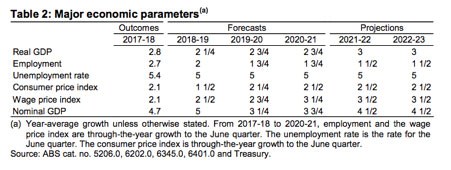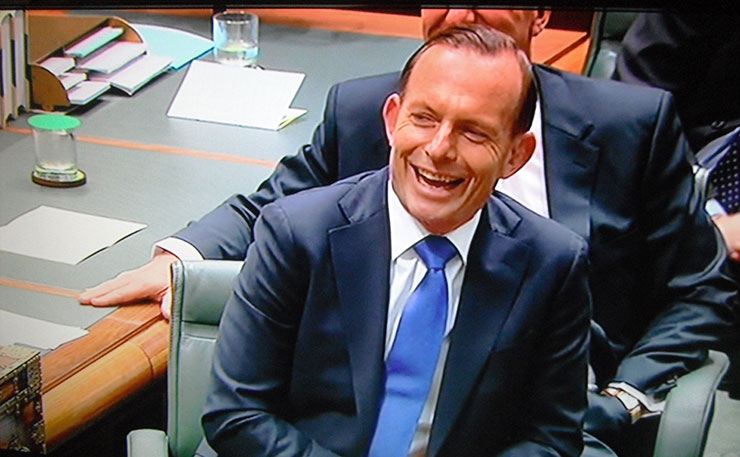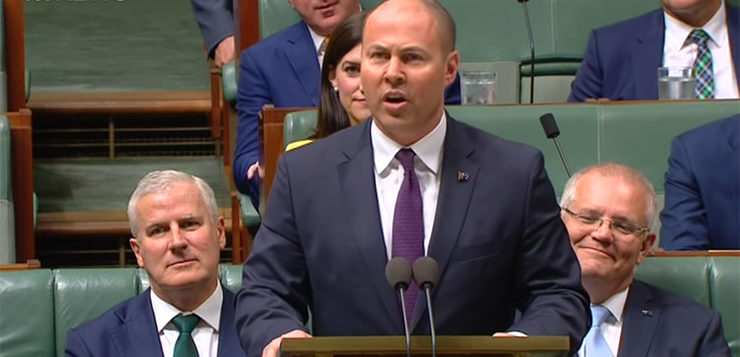DON’T MISS ANYTHING! ONE CLICK TO GET NEW MATILDA DELIVERED DIRECT TO YOUR INBOX, FREE!
Josh Frydenberg’s first budget is a massive tax giveaway that will only worsen Australia’s growing inequality. Ben Eltham analyses the 2019 Budget.
Josh Frydenberg is an up-and-comer in Liberal politics. Young and energetic, he would not normally be expected to be a Treasurer this soon in his career. Liberal Party blood-letting has given him the opportunity, and he has tried to seize it.
“The country is living within its means!” he reportedly announced inside the Budget lock-up, triumphantly brandishing a budget surplus.
His performance during the budget speech was equally declarative, as he rolled out the figures with undisguised glee. But will it be enough to secure the Coalition re-election? History and opinion polling tells us that is unlikely.
What the budget papers do tell us is something interesting about the state of Australia’s economy. Things are going well enough now, but there are storm clouds on the horizon.
“Domestically, uncertainty about the outlook for the housing market, in particular the extent to which housing prices fall, poses a downside risk to the forecasts for both dwelling investment and consumption,” the budget papers state. “A more subdued outlook for household income, or a further tightening in credit conditions, could constrain household spending amid high levels of household debt.”
There are also risks looming overseas. The US could go into a recession (bond yields on the US exchanges have been inverting); growth in China could slow. And the domestic outlook is decidedly uncertain.
Major questions should be asked about the budget forecasts, which seem even more unrealistic than usual. The budget forecasts slow and steady GDP growth, of 2.75 per cent this year trending to 3 per cent out to 2023. Employment growth is also forecast to be steady at 1.75 to 1.5 per cent. And unemployment is forecast to remain at 5 per cent for the next four years. Despite this, wages are somehow expected to grow. Anyone with even first year macroeconomics training will find this very hard to believe.

I’m not going to waste time writing about the surplus. A surplus this small is a meaningless achievement in economic terms; in political terms, it is chiefly about spin.
The simplest thing to say is that Australia’s government has balanced its budget. Whether that’s a good or a bad thing depends on variables like the state of the economy and current interest rate settings. If, like me, you think Australia’s domestic economy could use some more stimulus, there are arguments to cut interest rates and provide targeted stimulus to lower-income earners. You might also hope for some action to increase the bargaining power of workers, in order to lift wages. There is a little of either in this document.
On the other hand, there are tax cuts. Lots of tax cuts, as you might expect from a pre-election budget. The government has doubled its clumsily named “low and middle-income tax offset”, or LMITO. More than 4 million largely middle-class workers will get a $1,080 rebate once they lodge their tax returns. It’s useful tax relief, even if it pales into insignificance compared to the tens of billions to be showered on wealthy taxpayers in the latter years of the government’s tax cuts.
That’s because the government has accelerated the radical flattening of the income tax system announced in last year’s budget. The plan was already to make taxes much less progressive, rewarding the wealthiest taxpayers while giving low-income citizens relatively little. This year’s budget simply moves the schedule forward, so that wealthy citizens can expect to receive big tax cuts in 2022. It’s neither fair nor affordable, but it fits with the Coalition’s philosophy of flatter taxes and smaller government.
It’s not all bad. Few would disagree with tax relief for low income earners, such as those below the $41,000 bracket paying 19 per cent. The one-off energy payment for citizens receiving benefits (but not Newstart) will be welcome, even if the amount is far too small to actually make a difference to someone’s energy costs. And some of the infrastructure spending is welcome, particularly in the regions.
There are of course also tax cuts for business. The government is raising its instant asset tax write off threshold to $30,000, allowing for larger purchases to be instantly written off for tax purposes. This will have a small stimulatory effect, but probably not as large as previous years, given that the previous limit was already $20,000. Most of the tax cuts to small and medium business went through in last year’s budget, however, so there’s not a lot of help for the big end of town.

The government claims to be spending up on infrastructure, using the round figure of $100 billion over 10 years. As with previous budgets, any such claims should be taken with a grain of salt. Tony Abbott boasted he was an “infrastructure prime minister”, while actually delivering cuts in infrastructure spending. $10 billion a year is not a high spend on infrastructure, in the scheme of a half-trillion dollar budget. It’s not even that much of an increase in spending on previous years.
And there were some nasties, of course. Predictably, Frydenberg has refused to raise the rate of Newstart. Even worse, the government has announced it will “save” $2 billion from welfare by “simplifying and automating” income reporting to Centrelink. This sounds like an expansion of the dreaded “robodebt” scheme. No-one can have confidence in the Department of Human Services to sensitively or fairly implement such “savings”.
Unbelievably, foreign aid has been cut again. This government has a weird obsession with cutting aid to the world’s poorest and neediest. Foreign aid spending is now the lowest on record.
The National Disability Insurance Scheme also looks to be in trouble. One of the reasons the government can claim a small surplus is that there is a $1.6 billion underspend in the NDIS this fiscal year. Why is there an underspend? It appears that the NDIS is rolling out much more slowly than planned. This should not be a reason to save money, Disability advocates want the money quarantined, but the government has banked the savings instead.
The political analysis will focus on whether voters like the $1,080 tax handout. Some will, of course. But it seems unlikely that it will change many voters. Budgets rarely do.
The flat tax mania looks less politically positive when we consider that from 2024, someone on $200,00 a year will pay the same tax rate (30%) as someone on $45,000. That’s highly regressive, any way you look at it. It’s also hugely expensive to the budget bottom line. On one measure, the tax foregone equals $95 billion over the six years to 2025.
That massive “time bomb” in future revenues is not sustainable. It bakes in big trouble for future governments. $95 billion is an awful lot of schools, roads and hospitals that the Commonwealth government won’t be able to finance. Either spending will have to be cut, or tax rates will have to be raised again.
The flattened tax scales also have enormous implications for worsening inequality. As many academics and economists pointed out after last year’s budget, a progressive tax system is important because it is a fundamental break on income and wealth inequality. People earning $45,000 a year have a very different experience of life to those earning $200,000. Taxing them at the same rate gives the top income earners a massive advantage.
As I argued last year, “the flatter the tax system, the more unequal it is, because those earning lots of money can pay tax much more easily than those earning little. Australia is already a low tax country with worsening inequality.” Last night’s budget will likely make inequality even worse.
DON’T MISS ANYTHING! ONE CLICK TO GET NEW MATILDA DELIVERED DIRECT TO YOUR INBOX, FREE!
Donate To New Matilda
New Matilda is a small, independent media outlet. We survive through reader contributions, and never losing a lawsuit. If you got something from this article, giving something back helps us to continue speaking truth to power. Every little bit counts.




